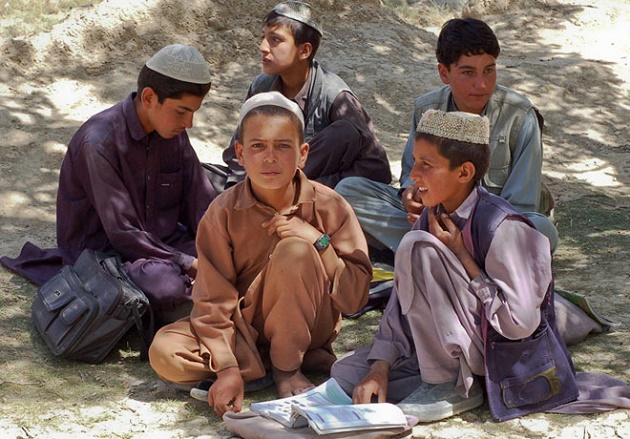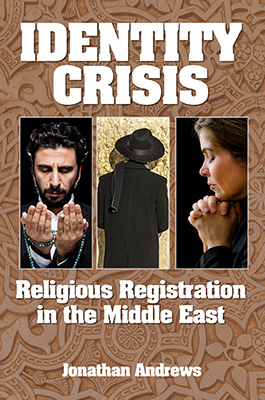Conversion from Islam is impossible in many places and in the few locations where it is possible legally, there are social and cultural impediments to change.
 ‘Symbols‘ by Michael Coghlan (CC)
‘Symbols‘ by Michael Coghlan (CC)
Why is the Middle East the way it is? What are the roots of the discrimination, the lack of the clear rule of law applied equally to all and the violence seen in all too many places? Why are Christians disproportionately the victims of these challenges?
This article, based on a recently published book,[1] looks at one aspect of society that is at the root of these challenges. The book illustrates how segregation of society on religious lines underpins discrimination, undermines the rule of law and fuels violence. This segregation is imposed and maintained by the religious registration system.

The book takes the reader on a tour of the countries of the Middle East using stories of people to illustrate the profound effects of this system on individuals, families, and society as a whole. Interspersed in the chapters on each country are thematic chapters including limitations on who can marry whom, who can worship with whom, apostasy, martyrdom, and burial. Among the surprising insights is that burial rights are a significant impediment to the growth of the church in some communities.
What is religious registration?
Everyone is assigned to a faith at birth. The registration might be generic, eg Christian, or very specific, eg Roman Catholic, Anglican. The registration is held in government IT systems and shown on some official documents, notably birth certificates and (in many countries) identity cards. The registration determines which religiously based legal system is applicable for personal status legal matters such as marriage, divorce, custody, burial, and inheritance. There is no complementary civil system; everyone is compelled to use a religiously based system. Islamic Shari’a, Christian Canon law, and Jewish Halakha law determine the personal status laws that apply to the respective communities. What happens when two people wish to marry but have different religious registrations? Which court system is applicable? Typically, this is highly problematic with one obliged to ‘convert’ so that their registrations match, accepting the legal, social, cultural, and family difficulties that this involves.
Historical origins
Historically, the systems seen today are adaptations of the Millet system of the Ottoman Empire. The Ottomans did not invent this system. The earliest recorded use is in the fourth century when it was applied to the communities of the Church of the East under the Sassanid Persian Empire. This empire’s state religion was Zoroastrianism. The Christians formed the Church of the East, whose leader, referred to as the Catholicos or Patriarch of the East, was responsible to the Persian king for the Christians within the Empire.
This system of maintaining Christians as a protected and respected religious community continued after the Islamic conquest of the Sassanids in 651. The Christian community flourished and was able to send missionaries to China and India.
Religious registration emerged during periods of history with limited social, economic, and geographic mobility. Most people lived their whole lives close to where they were born. Exceptions to this pattern were rare, in spite of well-established trade routes. The context of today is very different: how does the concept and application of religious registration need adjusting for the modern context of greater mobility and urbanisation, two global trends profoundly affecting the Middle East?
Why does this matter to Christians?
One theme of the book is religious conversion: can converts change their religious registration to match their beliefs? Conversion to Islam is legally possible and straightforward everywhere; conversion from Islam is impossible in many places and in the few locations where it is possible legally, there are social and cultural impediments to change.
The implementation of religious registration that we see in the Middle East today is far removed from the honourable origins under the Sassanids. What was designed to allow a distinct religious community to enjoy rites of passage of their choice while affirming loyalty to the political rulers is today used to marginalise those different from the majority. It is presumed that those whose registration is not of the majority are disloyal to the state and cannot be trusted. One expression of this is that in most countries there are restrictions on public sector employment for Christians. The system underpins discrimination.
In Lebanon, the linkage of religious registration to the electoral system is one cause of the dysfunctionality of the political system. The population is, in general, disillusioned with the status quo. Calls for change fall into the dilemma that it is the very politicians causing the problems who are unwilling to make the changes required to resolve the situation. Personal self-interest, or the interests of those close to them, means that they act to preserve their perceived power, prestige, and position, rather than act to govern for the well-being of all. Lebanon is an example of the fact that segregation of society on religious lines can have profound negative consequences for all.
Peace and reconciliation
It is often claimed that Islam is a religion of peace. What is meant by ‘peace’? Armed conflict can be stopped by one party surrendering unconditionally to the other. This brings ‘peace’ in the sense of an end to conflict, although the victors are able to impose whatever conditions they choose on the vanquished. It does not guarantee peace in the sense of stable, harmonious, and respectful community relations.
In Egypt, inter-communal strife is often followed by a ‘reconciliation meeting’. In situations involving Christians and Muslims, what typically happens is that Muslims seek draconian terms that marginalise and disadvantage the Christians, irrespective of the rights and wrongs of the situation. In such cases, criminal behaviour is overlooked, even exonerated. Religious registration is at the root of such practices, creating a context in which those who think of themselves as the majority feel that they are entitled to exploit others. The system undermines the rule of law.
Much of the violence and exploitation in the Middle East today pits one group of Muslims against another. The primary victims of Islamic extremism are ‘Muslims of the wrong type’, meaning those different from the perpetrators, although Christians and other non-Islamic religious groups are frequently caught in the cross-fire.
The book’s appendices give a summary of how the diversity within Islam, Christianity, and Judaism arose; politics, geography, and theology feature in the story of all three religions. One challenge for today is whether such diversity is to be celebrated or lamented, respected or crushed.
Signs of hope
So is there hope for the future? The book points to several positive developments of recent years.
In Egypt, that is referred to as the ‘re-convert issue’ was resolved in 2011. ‘Re-converts’ are those whose registration was Christian at birth but who changed to Muslim for any of a variety of reasons. In 2011, the legal right to revert to being registered as Christian was clearly established following a multi-year legal process. More than 4,000 people were part of the class action that secured this right. There have been no reported problems with implementation.
In February 2014, the Palestinian Authority removed religious registration from identity cards. They cited the Palestine Basic Law enacted in 2002 which states that there should be no discrimination on the grounds of gender, ethnicity, political views, or religion.
King Abdullah of Jordan is one of a number of senior political leaders urging Middle Eastern Christians to remain in their countries. Such statements are to be welcomed, although they appear incongruous given the stories presented in the book that illustrate Jordan’s discrimination against Christians and the very harsh manner in which the legal system can treat those who have converted from Islam.
Missional and practical implications
Those of us participating by prayer and other actions in spreading the good news of Jesus in the Middle East need to be aware of the challenges that confront those who come to faith in Jesus. They will face the ‘identity crisis’ of living and worshipping as Christians while being treated by the state as Muslim; their religious beliefs and registration are different. The typical pressure points are at marriage; the birth of children (whose birth certificates will describe them as Muslim); and when the children reach school age. Their children will be treated as Muslims by the state despite having been raised as Christians; the challenges to their sense of identity are profound.
The consistent call of Middle Eastern Christian leaders is that we all work to enable Christians to stay, to be part of a growing church.[2] It is acknowledged that there are a few cases where religious persecution obliges Christians to emigrate. These are the exception, not the norm.
There are several implications for Middle Eastern Christians. Religious registration is the root of why Christians are treated as second class citizens. This is one factor prompting some to emigrate. In some places it contributes to the difficulties in operating church buildings. It is also one reason why integrating converts to Christianity into churches is problematic in many locations. In some parts of the Middle East it is already the case that the majority of Christians are from Muslim backgrounds. The typical modus operandi of the church will be changed by this reality.
Those with access to policy circles should be asking for the effects of religious registration on society to be noted and policy formulation to include solutions. This applies to Middle Eastern policy circles and equally to those elsewhere who relate to Middle Eastern countries. Authentic local solutions need to be identified and implemented for the benefit of all. All governments across the region that want to fulfil their people’s aspirations for greater dignity and more and better jobs would be well advised to address the negative effects that religious registration has on economic, cultural, and social creativity.
What is the way through?
The book’s opening paragraph quotes a Middle Eastern Christian leader asking, ‘help us find a way through’. The challenges for converts to Christianity are clear; yet many, including church leaders, are supportive of the status quo. Pointing out that the current religious registration system leads to violations of international law appears unlikely to motivate change. So, the book describes the adverse effects on society as a whole and urges people of all faiths and none to seek authentic local solutions that will benefit all.
Jonathan Andrews is an independent researcher and writer who has worked in support of Christian communities in the Middle East and North Africa since 2000. He serves as chair of the Muslim World Forum.
This article was first published in the March 2017 issue of the Lausanne Movement Global Analysis magazine.
Endnotes
[1] Identity Crisis – Religious Registration in the Middle East by Jonathan Andrews is available in print and electronic forms from the Publisher’s website using the URL:
www.GileadBooksPublishing.com/identity-crisis.
The author may be contacted at [email protected].
[2] Editor’s Note: See article by A Syrian Pastor entitled ‘The Crisis in Syria’ in the January 2015 issue of Lausanne Global Analysis.

Las opiniones vertidas por nuestros colaboradores se realizan a nivel personal, pudiendo coincidir o no con la postura de la dirección de Protestante Digital.
Si quieres comentar o